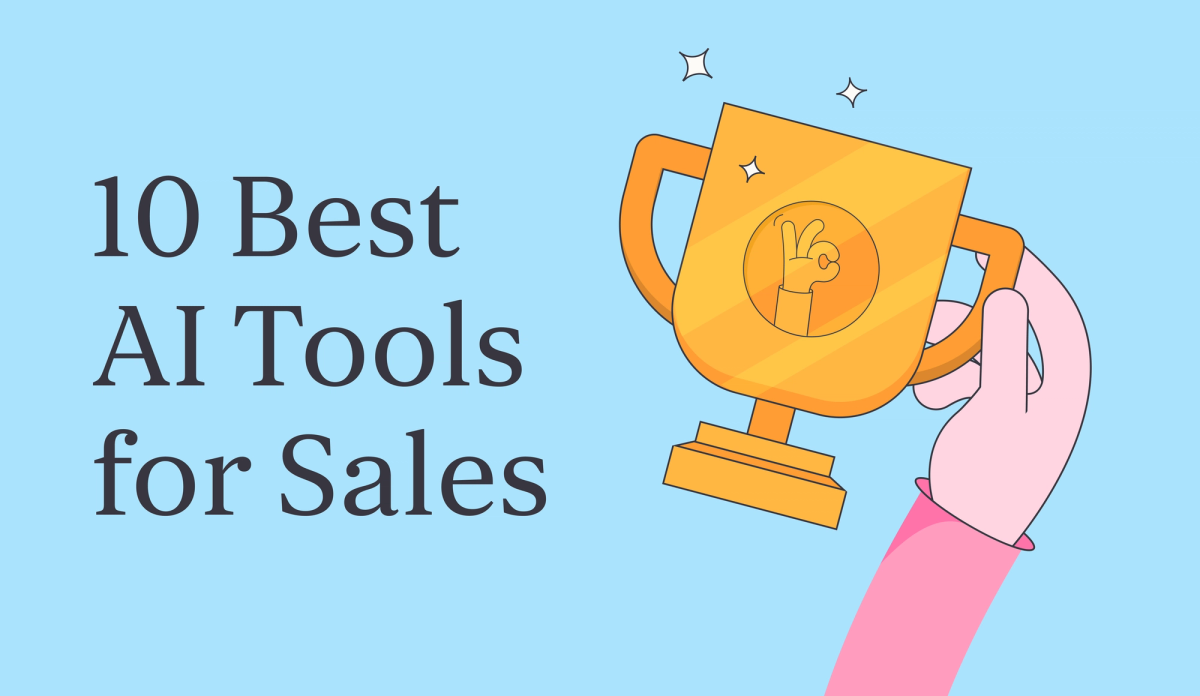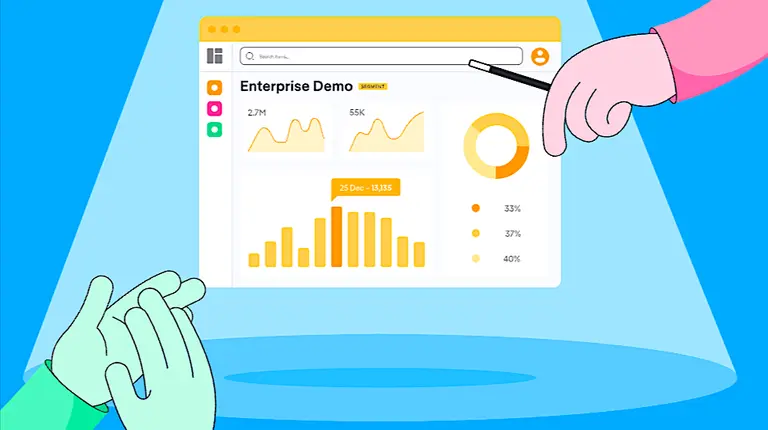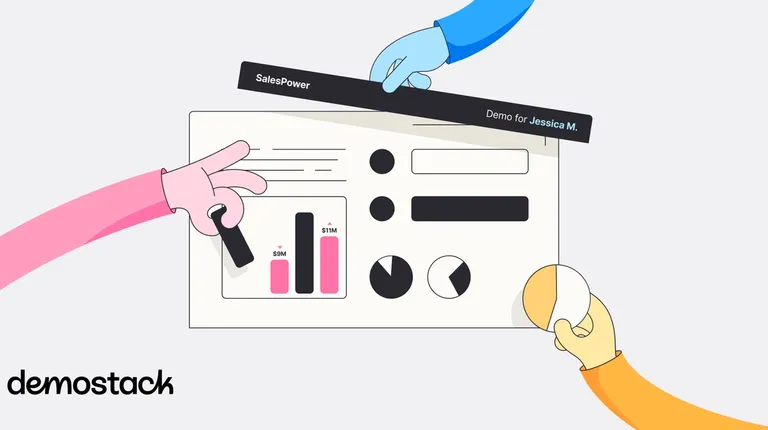What does a B2B buyer want after viewing your product tour? They already know what the product does. The next step is usually a live demo or sales meeting, where they expect to see whether your solution can solve their specific problems. However, many teams enter that meeting without knowing what the buyer actually needs. This lack of insight makes it harder to deliver a useful demo and can cause serious buyers to walk away.
But what if the information your team required was already at their fingertips?
The solutions you need are AI tools for sales. These tools highlight engaged accounts, pull in details from previous interactions, and help sales reps focus on the parts of the product that matter most to the buyer. They also make it easier to follow up quickly without losing track of your prospect’s journey.
For companies selling complex software, these tools help sales teams engage more precisely and respond to buyer needs earlier in the cycle. Recent research indicates that 36% of businesses are already using AI tools for sales and marketing functions. If you’re not leveraging these tools to win more business, your organization risks falling behind.
Let’s look at the top ten AI tools for sales that will help you shorten sales cycles and close deals faster.
10 Best AI Tools for Sales at a Glance
- Best AI-powered CRM: HubSpot Smart CRM
- Best AI-powered Demo Platform: Demostack
- Best Buyer Enablement Tool: Allego
- Best Sales Intelligence Platform: Clari
- Best AI Writing Tool for Sales: Lavender
- Best Prospecting & Outreach Tool: Apollo.io
- Best Notes & Documentation Tool: Fireflies.ai
- Best Customer Service Support Tool: Intercom
- Best Sales Meeting Assistant: Otter.ai
- Best Proposal Automation Tool: Qwilr
AI Tools for Sales: What Are They, and How Are Sales Teams Employing Them?
AI tools for sales are software applications that use artificial intelligence (AI) to support real sales work. The technology under their hood includes automation and machine learning (ML), but what makes them valuable is how they fit into the day-to-day flow of a sales cycle.
These advanced solutions are designed to help teams understand what buyers are doing, reduce time spent on manual prep, and stay focused on the conversations and deals that are most likely to move forward. AI tools for sales work by connecting to systems that teams already use, such as CRMs, calendars, email, and meeting platforms.
The tools process data from your business systems to identify changes in buyer engagement and point sales teams toward where their attention is most needed. The result is a clearer view of what’s happening, which helps reps prepare for upcoming meetings and focus on the right deals.

Sales teams use AI tools differently depending on their role and what’s required at that point in the sales cycle. Here are some examples of how different teams are putting them to use:
- Account executives use them to identify engaged accounts, prepare for meetings based on recent activity, and streamline follow-up.
- Presales and sales engineering teams rely on demo-focused AI tools to adjust product demonstrations based on prior activity and reduce time spent building custom environments.
- Sales enablement teams use AI-powered tools to track how reps are performing across conversations and content, then adjust coaching to improve execution where it’s falling short.
The differences between AI tools for sales are shaped by their use case and the problems they’re built to solve.
What Are the 10 Main Types of AI Tools for Sales?
Here are the primary types of AI tools for sales and how they use artificial intelligence to enhance what they do:
1. AI-Powered CRM Systems
CRMs with built-in AI features reduce the need for manual data entry by capturing emails, meeting activity, and calendar updates automatically. They help ensure deal stages and contact records stay current, even if reps don’t update them directly. When the system reflects real activity, managers can rely on pipeline views that match the actual state of the deal.
2. AI-Powered Demo Platforms
AI integration helps advanced demo software solutions reduce the technical support involved in creating and delivering sales demos at scale. These platforms automatically clone your live product environment, and then AI‑driven controls let teams update text and data in minutes so every demo reflects the buyer’s needs.
3. Buyer Enablement Tools
Buyer enablement tools help prospects continue evaluating a product after the sales call ends. The on-board AI recommends which materials to send, such as product documentation or pricing details, based on previous interactions and the current deal stage.
4. Conversational AI Tools
Conversational AI tools include chat and voice interfaces that interact with buyers during the early stages of engagement. AI is used to interpret responses in real-time, qualify leads based on defined criteria, and guide the interaction toward scheduling, handoff, or further discovery. These tools help teams respond quickly to inbound interest without needing a rep on every initial touchpoint.
5. Customer Service Support Tools
Customer service support platforms give sales teams insight into account health after the initial purchase. AI tracks shifts in usage patterns and supports trends that may signal churn risk or create new opportunities. Sales reps can use that information to address specific concerns or re-engage accounts showing signs of change.

6. Lead Scoring and Qualification Tools
Instead of relying on fixed rules, these tools evaluate leads using behavioral data and historical patterns. The AI assigns scores based on how likely a contact is to convert, helping reps prioritize accounts that are actively showing buying intent.
7. Notes and Documentation Tools
During calls, these AI tools transcribe what’s said and identify important details. Reps can review summaries instead of digging through entire recordings. Similar to the way Electronic Lab Notebooks sync with materials informatics platforms, many notes and documentation tools will sync notes to CRM fields automatically.
8. Prospecting and Outreach Tools
Sales reps use these tools to identify which accounts to contact and how to approach them. The integrated AI detects buyer signals like email engagement or web activity and recommends who to reach out to and when. Some platforms also generate message drafts based on account history or intent.
9. Revenue Forecasting Tools
Forecasting tools apply AI to evaluate whether active deals behave like past deals that have closed. The system updates confidence levels when it sees signals that usually lead to delay or loss. That makes forecasts more accurate and helps revenue leaders spot shortfalls before it’s too late to respond.
10. Sales Intelligence Platforms
Sales intelligence platforms use AI to scan external sources for updates that may impact sales strategy. Signals like job postings or buyer research are matched to CRM accounts to show where interest may be building. These insights help reps reach out when timing aligns, even if the account hasn’t engaged directly.
Benefits of AI Tools for Sales
AI tools for sales offer teams many benefits, including:
- Earlier lead qualification – AI tools identify high-intent buyers faster, so teams can focus efforts on opportunities that are more likely to convert.
- Faster demo preparation – Generating demo environments automatically and recommending relevant assets based on the buyer’s use case with AI tools reduces manual setup and allows teams to deliver demos more efficiently.
- More accurate forecasting – Tracking pipeline activity in real-time and updating projections based on engagement signals with AI tools improves planning and decision-making.
- Smarter follow-up – Outreach is informed by AI tools that identify what buyers are actually doing, which keeps communication timely and relevant throughout the deal cycle.
Stronger pipeline visibility – AI highlights changes in deal momentum and engagement to help teams spot where action is needed to keep deals moving.

Key Features to Look for in AI Tools for Sales
When evaluating AI sales tools for your organization, focus on the types that directly support how your team sells. While features vary by the solution’s type and use case, look for these capabilities that are essential across categories:
- CRM integration – AI tools that sync with your CRM ensure everyone is working with the same set of up-to-date information across the sales process.
- Real-time insights – Sales teams can act on engagement signals and deal movement as they happen without waiting for a report or update.
- Activity-based triggers – Buyer behavior can automatically prompt tasks, alerts, or follow-ups tied to specific deals.
- User-level visibility – Sales teams can see how the tool influences activity and outcomes across the pipeline, which helps align strategy and execution.
- Interaction summaries – AI extracts key details from sales activity and presents them in a format that’s quick to review and easy to use.
- Adaptability to your data – Tools that learn from your sales history generate insights and recommendations that reflect how your team actually works.
10 Best AI Tools for Sales
1. Best AI-powered CRM: HubSpot Smart CRM

A modern, AI-powered Smart CRM, HubSpot automates data capture by syncing emails, meetings, and calls directly to contact records. It uses AI-driven lead scoring and prioritization models tailored to your pipeline. The integrated Breeze AI suite includes tools for email drafting, meeting scheduling, data enrichment, and content generation that streamline sales workflows.
Price: A limited free version is available, and the full version is included with any premium HubSpot software purchase.
Review: “Our goal was to consolidate our systems, clean up our data, and ensure everybody was operating with the same information. This has made us more efficient and aligned as a team.”
2. Best AI-powered Demo Platform: Demostack

Demostack’s demo platform gives GTM teams and AEs the ability to deliver tailored demos quickly and independently, reducing delays and reliance on engineering. Most demo platforms lock you into a single format or require technical dependencies.
Demostack removes those barriers, giving your GTM teams and partners complete control with an AI-powered system that enables:
- Any Demo Format – Get cloned environments, live overlays, product tours, and hands-on sandboxes—all in one platform.
- No Engineering Required – Customize text, data, images, and workflows in minutes—no backend access or R&D needed.
- Deep Engagement Insights – Track engagement data, integrate with your CRM, and find out demos actually drive the pipeline.
It also features Playbooks that keep everything in one place—sales demos, decks, PDFs, and product tours—so your team delivers polished demos without scrambling for files.
Price: A free demo is available, with custom pricing by request.
Review: “Gainsight’s sales team has achieved an impressive 8% increase in close-win rates by leveraging Demostack-powered demos. Demostack demos closely replicate the look and feel of our actual products and are easy to customize.”
3. Best Buyer Enablement Tool: Allego

Allego uses AI to power digital sales rooms where buyers explore personalized content and collaborate with reps. Its conversation intelligence analyzes calls for buyer sentiment and key insights. AI-driven content recommendations ensure reps share relevant materials, while built-in coaching helps improve sales skills. Advanced analytics provide data to optimize buyer engagement and sales strategies.
Price: By inquiry
Review: “We saw over $8 million in new sales as a result of using Allego for Virtual Selling”
4. Best Sales Intelligence Platform: Clari

Clari’s AI solutions are designed to provide enhanced sales intelligence to modern revenue teams. The RevAI platform integrates three different kinds of AI models: Descriptive to automate time-consuming admin tasks, Predictive to guide more informed inspection and forecasting, and Generative to auto-create content that closes. Key features include Smart Deal Summaries, Advanced Opportunity Scores, and AI-guided CRM suggestions.
Price: Quote by request
Review: “I haven't found anything besides Clari that is this combination of business intelligence, operational control, and AI predictability all in one.”
5. Best AI Writing Tool for Sales: Lavender

Lavender’s AI Sales Email Coach uses AI to analyze and improve sales emails in real-time. It suggests clearer language, appropriate tone, and relevant personalization by bringing recipient research into your inbox. Integrated with Gmail and Outlook, Lavender scores emails and optimizes templates. It also provides analytics to track email performance and help refine outreach strategies.
Price: Four plans - Free, Starter at $27/mo., IndividualPro at $45/mo., and a Team Plan at $89/seat/mo.
Review: “There is a feature that leverages AI to write an email for you or take an email and reword it for you to make it stronger. All of this is easy to understand, use, and leverage.”
6. Best Prospecting & Outreach Tool: Apollo.io

An end-to-end sales platform, Apollo.io combines AI with a database of over 210 million contacts to streamline prospecting. It prioritizes leads, identifies company insights, and generates outbound messages based on your sales motion. Campaigns run across multiple channels with automated triggers and email analysis. AI also supports prospect meetings by preparing briefs, transcribing calls, and drafting follow-ups.
Price: Four tiers - Free (1 user), Basic at $49/user/mo., Professional at $79/user/mo., and Organization at $119/user/mo.
Review: “Apollo is easy to implement…and at the same time, it is an extremely powerful AI-enabled platform with plenty of features.”
7. Best Notes & Documentation Tool: Fireflies.ai

Keeping track of exactly what goes on in meetings and calls is simplified by Fireflies.ai. It uses AI to record, transcribe, and summarize meetings across platforms like Zoom, Google Meet, and Microsoft Teams. Not only does it identify speakers, but it also extracts key points and logs action items. Fireflies’ AI-generated transcripts and notes sync with CRMs like Salesforce and tools like Slack and Notion.
Price: Four levels - Free, Pro at $10/user/mo., Business at $19/user/mo., and Enterprise at $39/user/mo.
Review: “What I value most is the complete transcription of meetings and long videos, because it allows me to easily reuse the content. Additionally, the smart summaries are quick, accurate, and help me detect the essentials in seconds.”
8. Best Customer Service Support Tool: Intercom

Intercom’s AI customer service platform supports sales by handling inbound product questions with its Fin AI Agent, which pulls answers from your knowledge base. It escalates complex conversations and summarizes the context for handoff. AI-enhanced features like conversation routing, tone rewriting, and workflow automation help sales reps respond to queries faster and stay focused on qualified buyers.
Price: By request
Review: “Meeting customer demand has never been smoother, leading to an impressive 98% CSAT score year to date.”
9. Best Sales Meeting Assistant: Otter.ai

It’s time to put your meeting on OtterPilot. Otter.ai automates sales meeting workflows by joining calls, transcribing conversations in real-time, and generating summaries with action items. It identifies key sales insights, such as budget, authority, need, and timeline (BANT), and syncs notes directly to CRM platforms like HubSpot or Salesforce. Otter AI Chat enables teams to query meeting content and draft follow-up emails, enhancing post-meeting productivity.
Price: Four tiers with increasing features - Free, Pro at $8.33/user/mo., Business at $20/user/mo., and custom pricing for Enterprise.
Review: “The AI Notetaker can join Zoom calls to take notes and keep track of meeting minutes. It is also very easy to integrate with Zoom.”
10. Best Proposal Automation Tool: Qwilr

Qwilr leverages artificial intelligence to generate personalized proposals from CRM data, which reduces manual work and versioning errors. Sales teams can create interactive documents with dynamic pricing, embedded video, and e-signatures. Real-time analytics track buyer activity, and integrations with popular CRMs keep deal progress visible across the sales cycle.
Price: Two levels - Business at $35/user/month and Enterprise at $59/user/month.
Review: “We’re seeing deals close a lot faster while also adding a level of professionalism and enjoying powerful insights.”
Close Deals Faster with the Right AI Tool for Sales
AI tools for sales are transforming complex B2B processes into seamless experiences. They identify the right buyer signals at the right time, guide reps through tailored demos, and automate follow‑up so nothing slips through the cracks. With their ability to reduce prep time and sharpen each interaction, they help sales teams work more efficiently and deliver a consistently better buyer journey.
To close deals faster, you need Demostack, the AI-powered demo platform that helps sales and presales teams show the best versions of their product for every use case. It creates robust clones of your live environment and layers in prospect‑specific data so your demos are always reliable and relevant.
Demostack is designed to give you the full range of choices over how you demo. Whether showing your product without video, giving prospects a hands-on experience, or training your team and partners, the platform provides flexibility and ease of use without engineering support.
Try Demostack today to experience the ‘Ah-Ha’ moment that makes your buyers convert.





